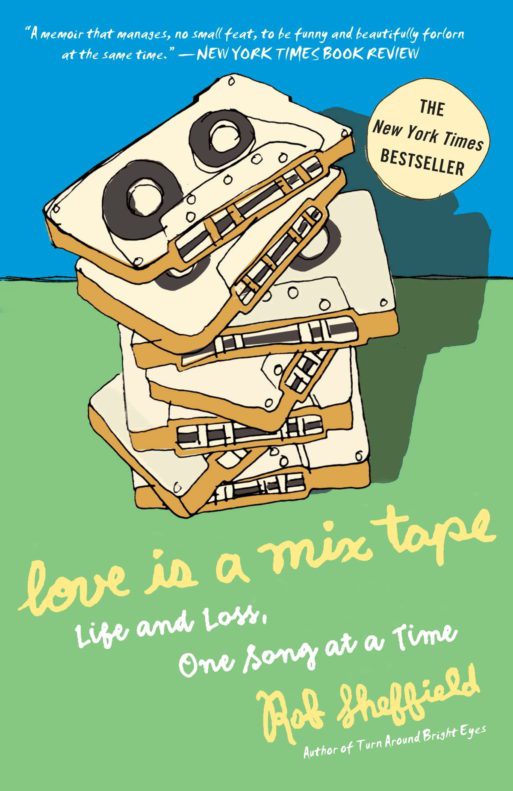 “Love is a Mix Tape: Life and Loss, One Song at a Time” is music journalist Rob Sheffield’s tribute to music, love and his wife, a punk rocker from Appalachia named Renee Crist, who died suddenly from a pulmonary embolism. His memoir is a love letter to the woman he clearly adored, to the alt music of the 90s and the era of cassette tapes. Sheffield uses 22 of the mixtapes he and Renee — also a music journalist — compiled during their relationship to tell their love story. They made mixes during their courtship, mixes for road trips, mixes for making out, mixtapes for sleeping, and finally mixtapes that Sheffield made while mourning the loss of Renee, who died just five years after the couple married at the age of 31.
“Love is a Mix Tape: Life and Loss, One Song at a Time” is music journalist Rob Sheffield’s tribute to music, love and his wife, a punk rocker from Appalachia named Renee Crist, who died suddenly from a pulmonary embolism. His memoir is a love letter to the woman he clearly adored, to the alt music of the 90s and the era of cassette tapes. Sheffield uses 22 of the mixtapes he and Renee — also a music journalist — compiled during their relationship to tell their love story. They made mixes during their courtship, mixes for road trips, mixes for making out, mixtapes for sleeping, and finally mixtapes that Sheffield made while mourning the loss of Renee, who died just five years after the couple married at the age of 31.
It was their shared love of music that brought the couple together and served as the foundation on which their relationship was built. Sheffield describes himself as a “shy, skinny, Irish Catholic geek from Boston” when he first met Renee, who he describes as “warm and loud and impulsive.” They met in Charlottesville, Virginia, where they were both graduate students. It was at a bar in Charlottesville that Sheffield “fell under the spell of Renee’s bourbon-baked voice.” In a chapter of “Love is a Mix Tape” called “Big star: For Renee,” Sheffield describes the couple’s first meeting — the bartender putting on Big Star’s “Radio City” and Renee being “the only other person in the room who perked up.” This sparked a conversation about music and Sheffield saying to Renee as she left the bar, “I’ll make you a mixtape!” It was the first of the mixtapes the couple would make throughout the their courtship and marriage.

Credit: www.robsheffield.com
In December 2002, years after Renee’s death, Sheffield moved from Charlottesville to Brooklyn and in the move found a box of old cassette tapes that became the genesis of his memoir. “I spent an evening putting all these mixtapes onto shelves and listening to them,” Sheffield said. “It helped me make emotional sense. It made everything really vivid, immediate, dredging up pleasurable and painful memories with the same song.”
Each chapter of the book is titled after a mixtape and lists the the songs and artists for each of the tracks on the tape. The memoir is peppered with enough references to both mainstream and more obscure bands to satisfy 90s music nerds. And there is enough heart in Sheffield’s writing about grief to engage less avid music fans who don’t necessarily relate to his passion for mixed tapes. He writes honestly and courageously about his grief, and the anxiety, depression, and hypochondria he felt. (At one point he thought he might be suffering from the same condition that ended Renee’s life.) He also describes his spiritual solace-seeking, and finally, his desire to start living again.
I found myself tearing up throughout the book, moved by Sheffield’s palpable love for his wife and wrenching grief after her death. His writing is raw with emotion, but he artfully weaves humor and joy throughout, capturing the highs and lows of falling in love, domestic partnership and tragic loss. Sheffield’s writing is nothing if not heartfelt, and he does a beautiful job of articulating his grief with a vulnerability that drew me into his world completely.

 “Love Is A Mix Tape: Life and Loss, One Song at a Time” by Rob Sheffield
“Love Is A Mix Tape: Life and Loss, One Song at a Time” by Rob Sheffield


 Our Monthly Tip: Make an “In Case of Death” File to Ease Loved One’s Grief
Our Monthly Tip: Make an “In Case of Death” File to Ease Loved One’s Grief
 Passing of Beloved Comedian Births a New Comedy Festival
Passing of Beloved Comedian Births a New Comedy Festival















